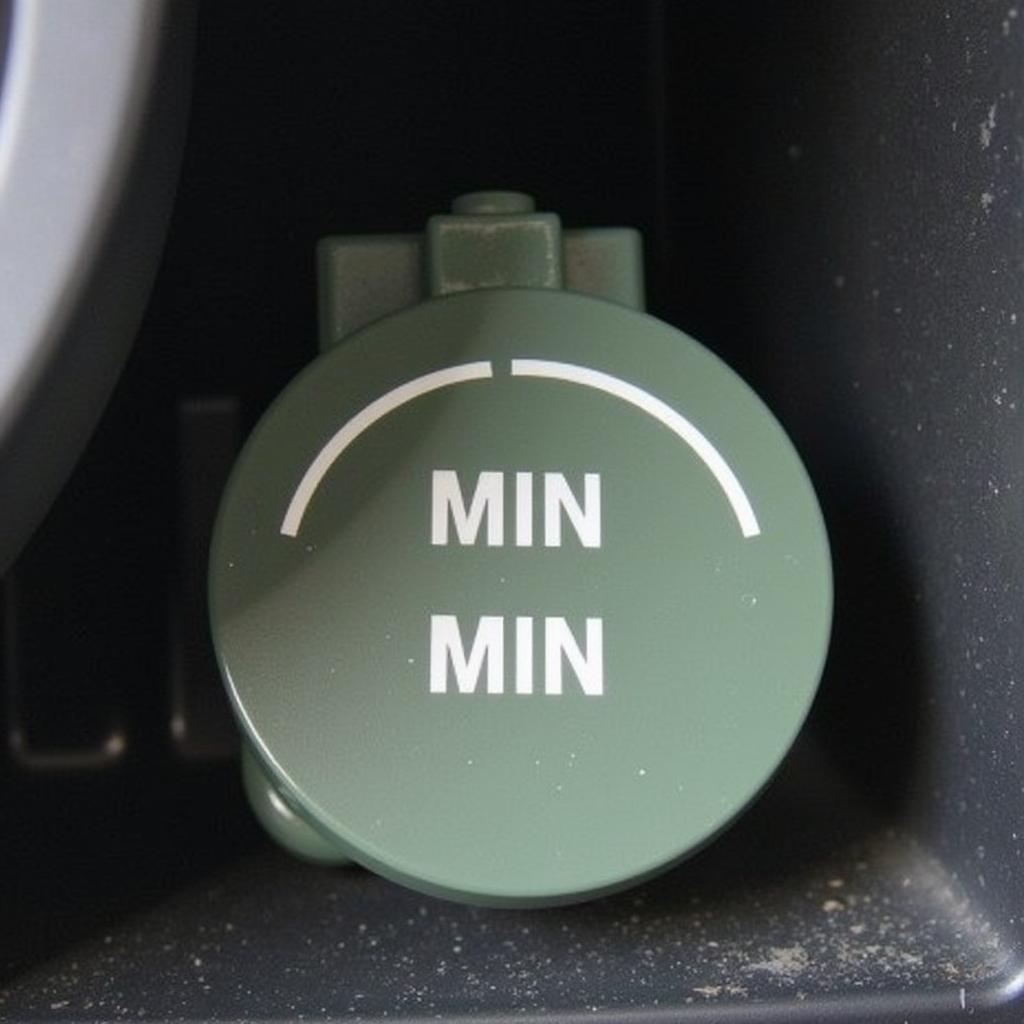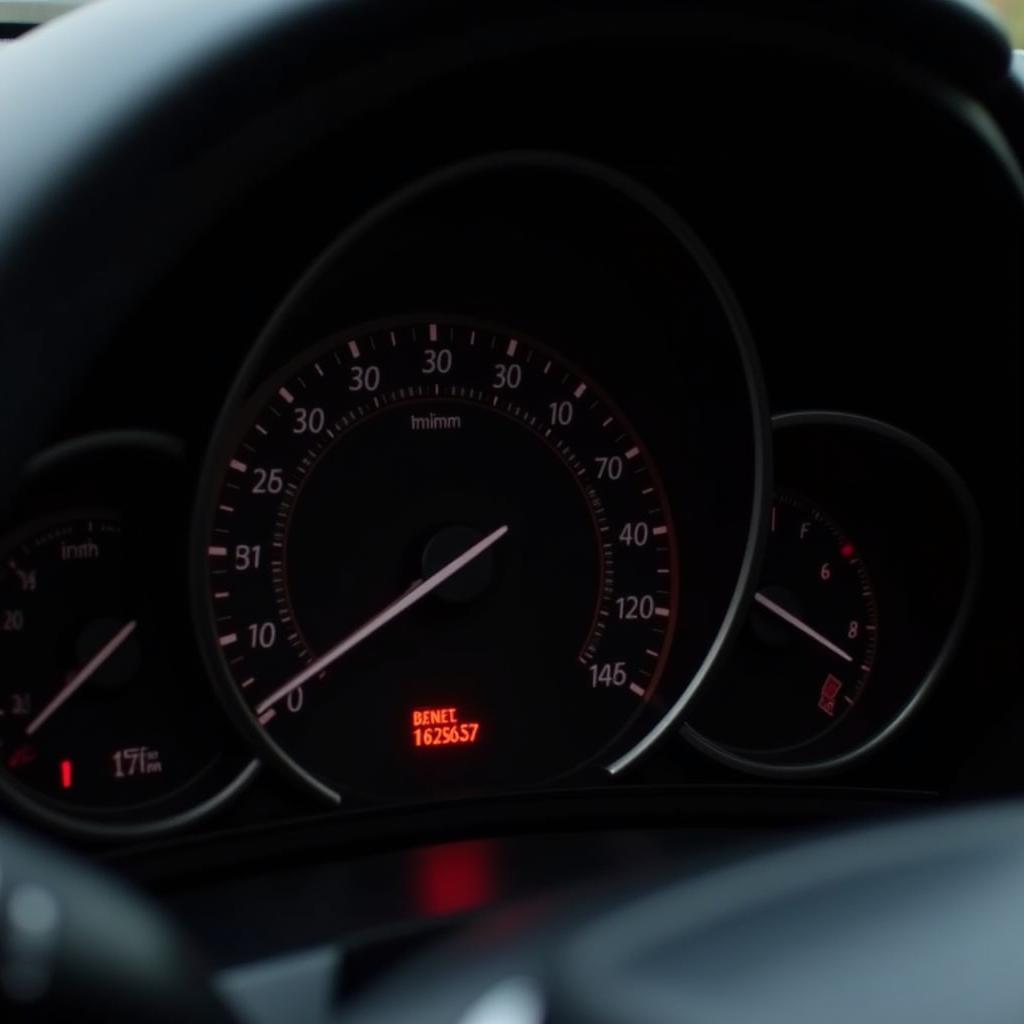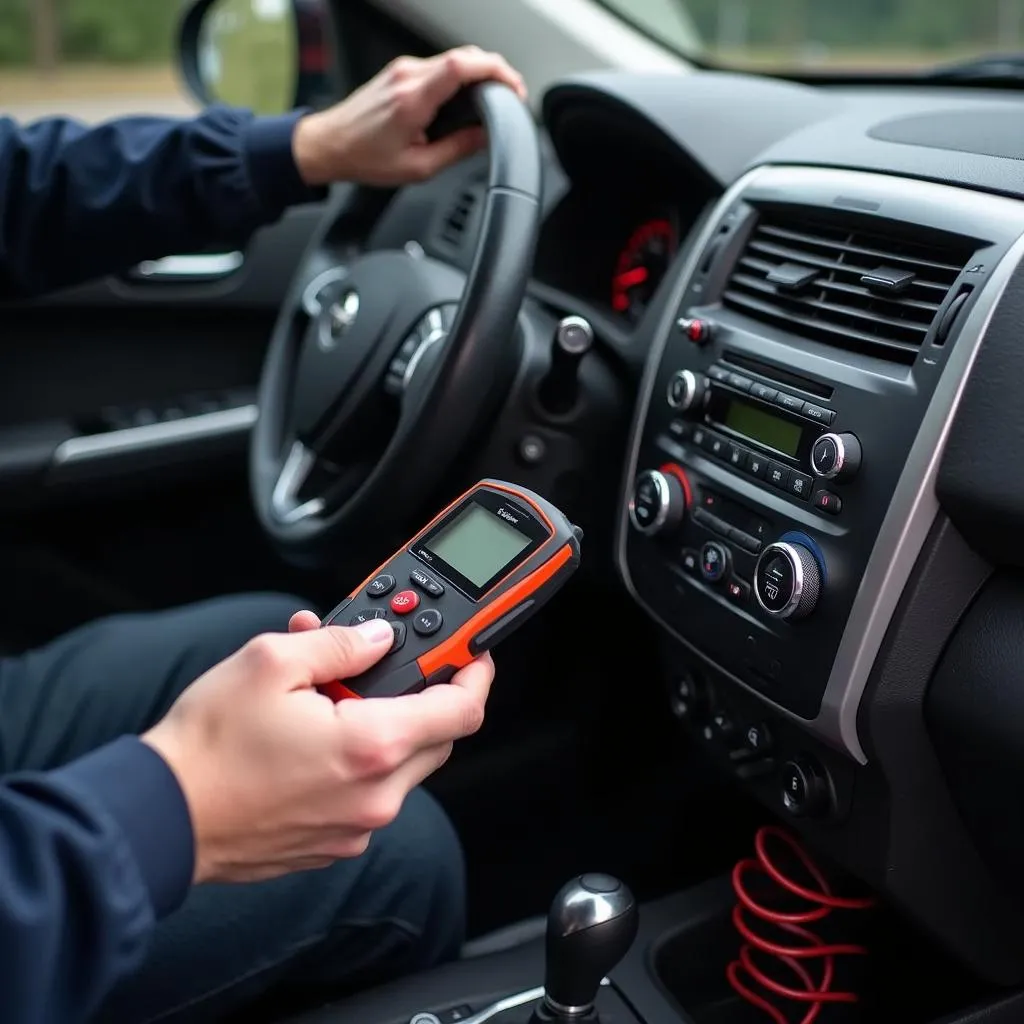The brake warning light on your dashboard is a crucial safety feature. When it illuminates, your car is trying to tell you something important about your braking system. Ignoring this warning light could lead to dangerous driving conditions and costly repairs. This article will delve into the common culprits behind a glowing brake warning light and equip you with the knowledge to address this issue effectively.
Common Reasons Your Brake Warning Light is On
Several factors can trigger your brake warning light. Let’s explore some of the most common culprits:
1. Worn Brake Pads
This is the most frequent reason for the brake warning light to illuminate. Brake pads have a wear indicator, a small metal tab that makes contact with the rotor when the pad material wears thin. This contact creates a high-pitched squealing sound and activates the warning light, signaling it’s time for a brake pad replacement.
2. Low Brake Fluid Level
 Brake fluid reservoir with low fluid level
Brake fluid reservoir with low fluid level
Your car’s braking system relies on hydraulic pressure created by brake fluid. If the fluid level drops too low, often due to a leak, air can enter the system, compromising braking performance. This drop triggers the warning light, urging you to check for leaks and replenish the brake fluid.
3. Faulty Brake Light Switch
The brake light switch, located near the brake pedal, activates your brake lights when you press the pedal. A malfunctioning switch can disrupt this signal, leading to brake lights that stay on constantly or don’t illuminate at all. This malfunction can also trigger the brake warning light.
4. ABS Problem
Modern vehicles are equipped with Anti-lock Braking Systems (ABS) to prevent wheel lockup during hard braking. A problem within the ABS system, such as a faulty sensor or control module, can illuminate the brake warning light. In such cases, the ABS warning light may also illuminate on your dashboard.
5. Issues with the Master Cylinder
The master cylinder acts as the heart of your braking system, distributing brake fluid to the wheels. A failing master cylinder, often indicated by a spongy brake pedal feel, can lead to a loss of hydraulic pressure and trigger the warning light.
What to Do When Your Brake Warning Light Comes On
2010 subaru forester brake warning light
“A glowing brake warning light should never be ignored,” says Jake Miller, a senior automotive technician with over 20 years of experience. “It’s your car’s way of communicating a potential safety hazard.”
Here’s a step-by-step guide on how to respond:
- Safely pull over: As soon as it’s safe, pull your car over to a safe location away from traffic.
- Check your brake fluid level: Locate the brake fluid reservoir under the hood. If the fluid level is below the “Min” mark, add the appropriate brake fluid to bring it up to the “Max” line.
- Inspect for leaks: Look for signs of brake fluid leaks around the master cylinder, brake lines, and near the wheels. If you notice any leaks, it’s crucial to have your car towed to a mechanic immediately.
- Avoid driving: If the brake fluid level is normal and you don’t see any leaks, it’s still crucial not to drive your car until a qualified mechanic has inspected the issue.
Can I Drive with the Brake Warning Light On?
The short answer is: It’s not recommended. Driving with an illuminated brake warning light can be extremely dangerous, as it indicates a potential problem with your braking system.
what if your brake pad warning light doesn't come on
Continuing to drive could lead to brake failure, putting you and others at risk. It’s best to err on the side of caution and have your car towed to a trusted mechanic for a thorough inspection.
Preventing Future Brake Warning Light Issues
2001 honda odyssey warning brake light will not go out
Prevention is key to avoiding brake problems. Here are some proactive measures:
- Regular brake inspections: Adhere to the manufacturer’s recommended brake inspection intervals.
- Timely brake pad replacement: Replace your brake pads before they wear down completely.
- Address brake fluid leaks promptly: Don’t ignore brake fluid leaks. Have them addressed by a mechanic as soon as possible.
- Quality brake fluid: Use high-quality brake fluid that meets your car’s specifications.
“Regular maintenance is cheaper than a major brake repair,” advises Miller. “A little preventative care goes a long way.”
Conclusion
volkswagen brake fault warning
The brake warning light is a crucial safety feature in your car. Understanding what triggers this light and taking prompt action can save you from costly repairs and, more importantly, ensure your safety on the road. Don’t ignore this warning; address it promptly to maintain a safe and reliable driving experience.
FAQs
1. What does a flashing brake warning light mean?
A flashing brake warning light usually indicates a more serious issue with the braking system, potentially a complete or partial brake failure. It’s crucial to stop driving immediately and have your car towed to a mechanic.
bmw brake pad sensor warning light
2. How much does it cost to fix a brake warning light issue?
The cost of repair depends on the underlying cause. A simple brake pad replacement is relatively inexpensive, while fixing a faulty ABS control module can be significantly more expensive.
3. Can I add brake fluid myself?
Yes, you can add brake fluid yourself. However, it’s important to use the correct type of brake fluid recommended in your car’s owner’s manual and to follow the proper filling procedure.
4. How often should I check my brake fluid level?
It’s a good practice to check your brake fluid level at least once a month and before any long road trips.
5. Why is my brake warning light on but my brakes feel fine?
Even if your brakes feel normal, a lit brake warning light shouldn’t be ignored. It could indicate a hidden problem that hasn’t fully manifested yet.
6. Can a bad battery cause the brake warning light to come on?
While unlikely, a severely depleted or faulty battery can disrupt the electrical signals in your car, potentially triggering a false brake warning light.
7. Is it safe to drive my car if I just added brake fluid?
If the brake fluid level was low and you’ve refilled it, it’s generally safe to drive to a mechanic for a checkup. However, if you notice any leaks or unusual brake behavior, it’s best to have your car towed.


